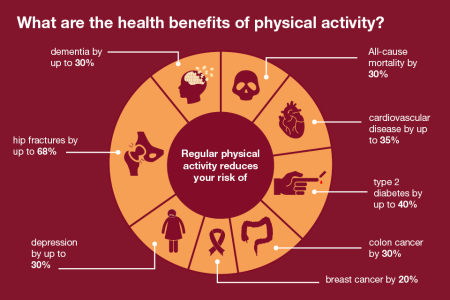
In our fast-paced, technology-driven world, it’s easy to neglect our physical health in favor of spending more time on our devices. However, research has shown that regular exercise is not only crucial for maintaining physical well-being, but it also plays a critical role in improving mental health.
Physical Benefits of Exercise
Before we delve into the mental health benefits of exercise, let’s first explore some of the physical benefits. Exercise helps in improving cardiovascular health, strengthening muscles and bones, and maintaining a healthy weight. It also boosts energy levels and enhances overall physical fitness. These physical benefits not only contribute to a healthier body but also have a direct impact on our mental well-being.
Exercise and Mental Health
Regular exercise has been proven to have a positive effect on mental health by reducing symptoms of anxiety, depression, and stress. When we exercise, our body releases endorphins, also known as “feel-good” hormones. Endorphins act as natural painkillers and help in improving mood, reducing stress, and promoting a sense of well-being.
Moreover, exercise helps in reducing levels of cortisol, the stress hormone, in our body. By lowering cortisol levels, exercise helps in alleviating feelings of anxiety and tension. Physical activity also promotes better sleep, which is essential for maintaining good mental health.
Improving Cognitive Function
In addition to reducing symptoms of anxiety and depression, exercise has been found to enhance cognitive function and improve focus and concentration. Regular physical activity stimulates the production of brain-derived neurotrophic factor (BDNF), a protein that plays a key role in learning, memory, and cognitive function.
Exercise also increases blood flow to the brain, providing it with more oxygen and nutrients, which can help in improving brain function. Studies have shown that individuals who engage in regular physical activity have better cognitive abilities and are at a lower risk of developing cognitive decline as they age.
Building Resilience
Exercise not only improves mental health but also helps in building resilience against the challenges and stressors of daily life. When we exercise, we develop a sense of accomplishment and confidence, which can boost self-esteem and resilience. Physical activity also provides an outlet for releasing pent-up emotions and frustrations, helping in coping with stress in a healthy manner.
Incorporating Exercise into Your Routine
Now that we understand the importance of exercise for mental health, it’s essential to find ways to incorporate physical activity into our daily routine. Whether it’s going for a walk, taking a fitness class, or engaging in sports, there are plenty of options to choose from. The key is to find activities that you enjoy and that fit your schedule.
Start by setting small, achievable goals for yourself and gradually increase the intensity and duration of your workouts. Remember that consistency is key when it comes to reaping the mental health benefits of exercise. Find a workout buddy or join a group class to stay motivated and accountable.
Conclusion
Exercise is not just about physical fitness; it’s also about mental well-being. By incorporating regular physical activity into your routine, you can improve your mood, reduce stress, enhance cognitive function, and build resilience against life’s challenges. So, lace up your sneakers, hit the gym, and start reaping the mental health benefits of exercise today!
